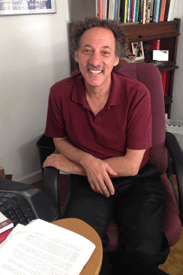
David Gespass
An Alabama lawyer who visited me in jail apparently violated attorney-client confidentiality. And evidence suggests he did it by communicating with a lawyer for a nonprofit organization founded by perhaps the nation's best-known consumer-rights advocate.David Gespass, a Birmingham attorney supposedly committed to civil rights and the First Amendment, visited me twice while I was incarcerated "for blogging" in the Shelby County Jail. A letter Gesspass wrote to me and my wife, Carol, shows he offered no legitimate path for getting out of jail or for seeking justice based on our unlawful treatment. In other words, Gespass' failure to do his job -- like filing a habeas corpus petition for my immediate release -- is a big reason my stay in jail lasted five months.
But Gespass was not content to simply do a horrible job and act as a con man on behalf of someone, likely opposing lawyers. He also, evidence suggests, trashed me to a prominent out-of-state lawyer, who also supposedly cares about civil rights and the First Amendment. That would be Paul Alan Levy, of Public Citizen, a D.C.-based organization founded by Ralph Nader.
Almost immediately after being released from jail, with no help from David Gespass, I contacted Levy because of Public Citizen's reputation for helping victims of injustice. I quickly learned that Levy is a monumental asshole or smart-ass (take your pick), and he sullies the decades of good work Ralph Nader has done for victims of the powerful and wealthy.
I came away with evidence that Gespass and Levy had no interest in helping a victim of grotesque injustice, they also had no regard for the ethical foundations of their profession, of which attorney-client confidentiality might be the most famous. Why would supposedly progressive lawyers treat a victim with such disdain? My guess is that when it comes to progressivism vs. the legal tribe, many lawyers ditch their progressive ideals and side with corrupt figures in their own profession. It's also possible that many liberal lawyers are "progressive" in name only, that they adopt the label because it gives them a certain persona that they want affixed to their names. The label probably helps them make money, without needing a genuine commitment to justice.
The Reporters Committee for Freedom of the Press (RCFP) has portrayed Levy as a staunch advocate for free speech. You will soon see why, based on my experience, that is a cruel joke.
What is attorney-client confidentiality? Well, it's a little different from attorney-client privilege, as explained in an article from the American Bar Association:
The concepts of lawyer confidentiality and attorney-client privilege both concern information that the lawyer must keep private and are protective of the client’s ability to confide freely in his or her lawyer, but the concepts are not synonymous. Terminology from both, such as “privileged information” or “waiver” are sometimes used interchangeably, further causing the differences between them to become somewhat blurred. However there are several critical differences between the two in their applicability and exceptions and the extent of information covered.
The principle of confidentiality is set out in the legal ethics rules in each jurisdiction and in ABA Model Rule 1.6. Model Rule 1.6 Comment [2] states: “A fundamental principle in the client-lawyer relationship is that, in the absence of the client's informed consent, the lawyer must not reveal information relating to the representation. . . . This contributes to the trust that is the hallmark of the client-lawyer relationship.” A violation of the ethics rule may lead to disciplinary sanctions.
On the other hand, the attorney-client privilege, sometimes referred to as the testimonial privilege, is a concept from the law of evidence and is present in the common law or statutes of the fifty states. The client, acting through the lawyer, may claim the privilege. As stated in Model Rule 1.6, Comment [3]: "The attorney-client privilege and work-product doctrine apply in judicial and other proceedings in which a lawyer may be called as a witness or otherwise required to produce evidence concerning a client.”
My relationship with Gespass did not go beyond two jailhouse meetings, although he did take certain actions on my behalf -- namely reviewing the sealed file in my case, apparently by visiting the Riley Jackson Law Firm, home to Rob "Uday" Riley, who apparently led the effort to bring bogus defamation claims against me. Because our relationship did not involve judicial or other official proceedings, Gespass and I are not dealing with attorney-client privilege -- we are looking at attorney-client confidentiality.

Paul Alan Levy
(From rcfp. org)
Even though, I did not hire Gespass, he still was bound to honor confidentiality, as explained in an article at nolo.com:
Each day, countless people with legal problems consult attorneys before deciding if they want to hire them. Many, if not most, criminal defense attorneys offer free consultations for potential clients. Understandably, some defendants wonder whether such consultations—with attorneys who don’t yet and might not ever represent them—are protected.
In general, as long as the prospective client is seeking legal advice or representation and reasonably believes the communication will be confidential, the consultation is privileged. This is so even if the would-be client never pays or hires the attorney.
The nolo.com article then really hits home for my situation:
The potential-client-confidentiality principle also comes into play when an arrestee consults with a public defender at or from the police station or jail. The conversation is privileged, even though the public defender does not, and may never, represent the arrestee, and even though the public defender doesn’t receive a fee.
Gespass was not a public defender, but he was in consulting in jail with an arrestee (me). Gespass offered me zero legal help -- and apparently being pissed because I did not fall for his con act -- he violated confidentiality and stabbed me in the back.
How exactly did that happen? We will provide details in an upcoming post.
Gespass has admitted publicly that Judge Claud Neilson's rulings in my case were "insane," "bizarre," and "way out of bounds." So Gespass knew I had been victimized, as had Carol. But he did nothing to help, and evidence suggests, he actively tried to hurt us.
It's hard to get much lower than that.
(To be continued)
